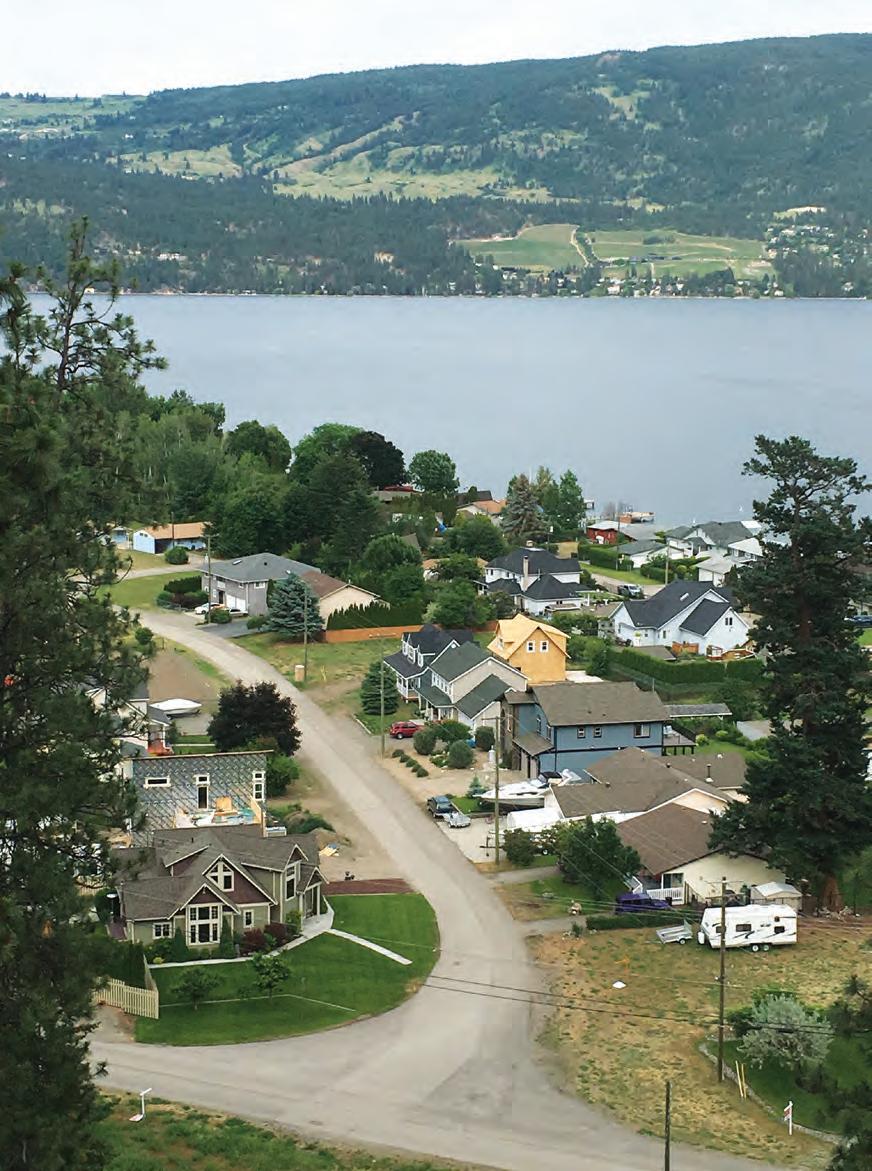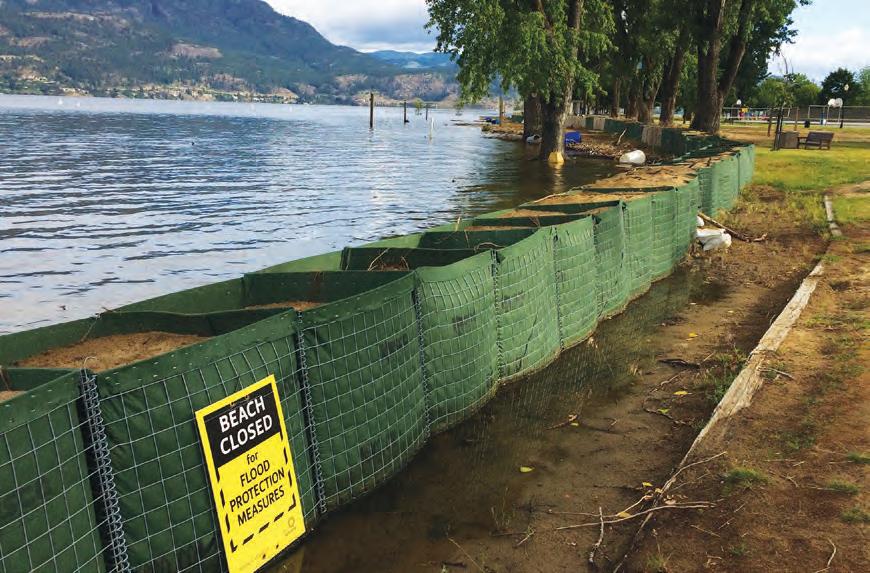
8 minute read
Sustainable Communities
We will initiate and support efforts to create a healthy built environment in which all people throughout the region enjoy access to a diverse range of housing options, remain safe in the face of emergencies and experience a high quality of life.
The Regional District advocates and facilitates for the provision of housing. It’s ideally placed to convene discussions, outline innovative housing solutions and create best practises to inform local development policies and building standards.
Advertisement
Supporting Housing For All
Encouraging a healthy-built community and a broad spectrum of housing options is an issue local governments across BC and our country are facing. And the Central Okanagan is no different.
That’s why the Regional Board endorsed the Regional Housing Needs Assessment. Given the closeness of communities across the Central Okanagan and how connected they are through the transportation network, the supply and demand of the housing market is best considered at the regional level.
The Assessment is a key initiative of the five-year Regional Growth Strategies Priority Projects Plan and was developed over the past 11 months through collaboration with local government partners, the public and other stakeholders. It’s a detailed, descriptive analysis of the current housing needs and issues across the region.
With a better understanding and definition of the larger regional situation, each community’s role in contributing to the solution can be better understood, supporting a coordinated and consistent response toward regional housing goals. Partner local governments and housing stakeholders can utilize the assessment as a planning tool and resource.
MONITORING OUR REGION’S GROWTH
We’ve taken steps to ensure our Regional Growth Strategy (RGS) stays relevant and continues to guide coordinated long-range planning as mandated by the Local Government Act. It helps local governments plan for their communities while keeping regional decisions and issues in focus.
During 2019, the Regional Board endorsed a program for monitoring the implementation of initiatives that were identified in the Regional Growth Strategy Priority Projects Plan. The plan was developed in collaboration with stakeholders and other local governments across the region.
This five-year action plan identified important projects with regional significance to be undertaken in order to achieve the actions, effectiveness and objectives of the RGS.
The monitoring program provides a framework for monitoring and evaluating the impact on Regional Growth Strategy goals and ten key issue areas and created the foundational measures for ongoing monitoring, tracking and evaluating the implementation of the Regional Growth Strategy policies and other initiatives that contribute to achieving RGS goals.
Planning Together As A Region
Planners from across the region are regularly challenged with common issues and developing effective solutions.
While they’re often working on common topics this collective experience and lessons-learned is not always shared. And particularly stubborn challenges often require creative approaches and ideas for problem solving that can only come from multiple perspectives, discussions with experienced professionals and the lesson learned from piloting potential solutions.
The Regional Growth Strategy Priority Projects Plan identified the need for a Regional Planning Lab. This forum bring planners and other professionals from around the region together to work through difficult technical challenges related to specific planning topics or regionally significant projects.
As a forum for discussion and relationship building, the lab strengthens the foundation of regional knowledge-sharing and consistency. As a space to identify and test possible solutions to shared problems, the lab forums help to expand the opportunities for collaboration.
But they’re not all talk. While the lab sessions begin with an exploration of the challenges faced, they end with actions that can be implemented, learned from, and improved upon.
This year the RDCO hosted two Regional Planning Labs. The first lab tackled land use compliance in the Agricultural Land Reserve and resulted in the creation of a Regional Agricultural Compliance and Enforcement Strategy. The second lab focused discussions on cell tower approval policy and 5G communications to assist land use authorities in developing antenna system siting protocols.
The outcomes from these sessions may be used by each participant in assessing specific development applications and to help those people making applications.
A Safer Business Community
What could potentially be the largest crime prevention program in the Central Okanagan is underway on the westside of Okanagan Lake.
Business Watch is modeled after the highly successful residential Block Watch. It brings business owners and their employees together as the eyes and ears in their community. They watch for and report any suspicious or criminal activity to each other and when required to the RCMP, while stepping up their safety and security measures.
The goal is to create a safer business neighbourhood for both employees and customers.
Businesses that register with the no-cost RDCO Crime Prevention program receive security assessments, tips and ongoing access to information to help employees and customers continue to feel safe and secure.
Participating businesses display a Business Watch emblem and are encouraged to communicate, cooperate and be involved in their community. This example of proactive involvement is integral to assist RCMP in its efforts to prevent and reduce criminal activity.
Business Watch is a partnership involving the RDCO Crime Prevention service and Greater Westside Board of Trade, City of West Kelowna, Westbank First Nation and RCMP. Find out more at rdco.com/businesswatch
WILSON’S LANDING FIRE FIRST MEDICAL RESPONSE
Minutes count in any medical emergency. The faster people receive treatment, the better the result.
2019 saw the launch of a First Medical Response program, delivered by trained members of the Wilson’s Landing Fire Department for communities it serves along Westside Road.
Now, residents in medical distress living from Traders Cove to Shelter Cove will see their fully trained and licensed firefighters quickly respond with the goal of improving patient outcomes.
First Medical Responders are key partners with BC Ambulance in providing timely assistance to patients and when requested, ambulance assistance.
This program was launched after a year of extensive training and licensing for more than half of the fire department members.
Updating Secondary Suite Regulations
Through the direction of the Regional Board, staff has been working with and engaging stakeholders and residents on potential changes to secondary suite regulations in the RDCO Zoning and Joe Rich Rural Land Use bylaws. In order to bring the RDCO into line with other local governments, the Board suggested secondary suite applications be considered by policy rather than through bylaw amendments.
During the review process, it was identified that increasing density by permitting secondary suites in all residential zones may cause drainage and slope stability challenges, particularly in areas without access to community sewer and without proper drainage plans. As a result, it’s proposed that the current process will continue allowing the Regional Board to make informed decisions on individual applications on a site specific, case by case basis.
As well, recent changes and updates to the provincially legislated BC Building Code have been included that reflect design and construction requirements for secondary suites. Following a Public Hearing, it’s anticipated in early 2020 final adoption to the amended secondary suite regulations will take effect.
Leaders In Emergency Management
We all know the Central Okanagan has been at the forefront in responding to, managing and recovering from large scale emergencies. Unfortunately, we’ve had many years of experiencing wildfires and floods that have put our collaborative regional program to the test.

During 2019, one of the Strategic Priority goals was adoption of a new Emergency Program Bylaw.
This new bylaw reflects the current operational guidelines and experiences that have been learned in responding to larger scale emergencies over the past 24 plus years, when the first bylaw was adopted. Part of the success of our Central Okanagan program is due to the involvement and participation of each local government and Westbank First Nation, whenever an emergency strikes. We realize that together we’re better, stronger and more resilient.
The Regional Board approved a new agreement with the City of Kelowna which provides the intraregional Emergency Management Program. The new Memorandum of Understanding provides the framework for both organizations to better plan, monitor and manage the program for local governments in the Central Okanagan.
In addition, it’s anticipated that during 2020 a new Preparation for Emergencies Bylaw will be adopted once local governments and the Province provide their approval. This updates and modernizes the original bylaw from 1991 and includes a description of the service, reflects participating areas and provides additional cost recovery methods.
We’re not sitting by and resting on our experienced laurels. We’re taking steps to keep ahead of the emergency management curve and live the message we preach to be prepared.
The RDCO fire departments in Ellison, Joe Rich, North Westside and Wilson’s Landing are each requesting $25,000 from the Union of BC Municipalities Community Emergency Preparedness Fund to assist with purchasing new or replacement equipment and to provide training that will support disaster response and recovery.
The RDCO will also partner with other local governments in the region for grants to assist with planning safe emergency evacuation routes that would be used to safely move people, personal property and animals from an area during an emergency.
One Block At A Time
We’re taking crime prevention to the streets, one block at a time. The Block Watch program is one of the easiest and most successful crime prevention programs operating around the world.
During 2019, 17 new Block Watches began operating bringing to 114 the number of neighbourhoods that are displaying the Block Watch sign in the electoral areas, Lake Country, Peachland, West Kelowna and Westbank First Nation.
The beauty of Block Watch is its simplicity. It’s designed so that neighbours watch out for each other and get involved in discouraging and preventing crime at the street and neighbourhood level. They are often the first to know when someone or something suspicious and unusual is going on and are able to report it to the RCMP. By working together, neighbours can actively prevent crime in the most effective way – before it happens.
WE’RE THERE FOR VICTIMS OF CRIME
Whenever someone is affected by crime, the caring, professionally trained staff with the Central Okanagan RCMP Victims Services program is there to help. Their desire is to help lessen the impact of crime and trauma on those directly victimized as well as providing support for witnesses, their friends and families.
In 2019, the program received more than 870 new referrals with staff supporting about 214 clients every month. Assistance can range anywhere from emotional support, to practical help navigating the criminal and justice system, even referrals between partner agencies.
Public awareness and education about services for those victimized or traumatized by crime is another key goal. Our caseworkers attend community events like the annual Downtown Kelowna Block Party as well as provide presentations to local groups and organizations.
Mutual Aid Is Beneficial
Sometimes, two is better than one. This is especially true when two paid-on-call fire departments with their individual resources can team up to work together in the occasional instance where their mutual response is needed.
A Mutual Aid Agreement between the RDCO Joe Rich Fire Department and Regional District of Kootenay Boundary Big White Fire Department will continue.
The renewal of the agreement for an additional five years will as required, provide each department service area with additional equipment and fire-fighting resources at no additional cost.
In fact, when possible members from all RDCO paid-oncall departments in Ellison, Joe Rich, North Westside and
Wilson’s Landing train together to improve their response when supporting each other. This kind of coordination also helps reduce training costs.
All four departments are now certified to the interior service level and if required and conditions allow, can go inside burning buildings for rescue and firefighting.
Resiliency And Recovery
The Regional Board has approved submitting an application to the Union of BC Municipalities (UBCM) Community Emergency Preparedness Fund. The regional district is seeking $150,000 to complete a Critical Infrastructure Assessment and a Preliminary Flood Mitigation Strategy. Both are key components of the second phase of the Regional Floodplain Management Plan. The UBCM administers the funding program for the Provincial Government which offers grants to enhance the resiliency of local governments in responding to and recovering from emergencies.
2020 Sustainable Communities Initiatives
• Update Temporary Farm Worker Housing regulations for Zoning Bylaw in keeping with regional approach.
• Review Zoning Bylaw and Joe Rich Rural Land Use Bylaw regulations
• Commence Regional Housing Strategy, Regional Citizen Survey.
• Promote enhanced communication to the public by updating all brochures, information packages and the RDCO website.
Regional Planning
• Continue to work on and complete prioritized projects scheduled for 2020 as outlined in the RGS Priority Project Plan.
- Implementation Monitoring Report and Annual Update
- Commence the Regional Growth Strategy Five Year Review.
- Commence the Regional Agricultural Strategy, and continue to implement the Regional Agricultural Compliance and Enforcement Strategy.
• Host Regional Planning Labs.










